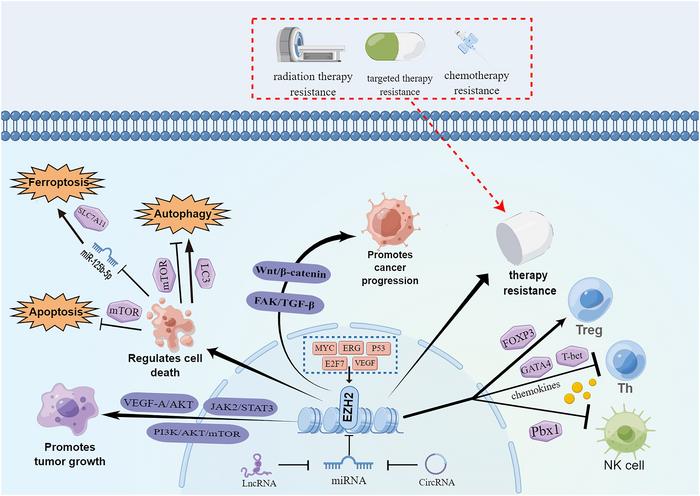The dynamic landscape of cancer therapy is experiencing a transformation with the research focus on histone methylation and its implications in tumor progression. Central to this discussion is EZH2, a protein known for its critical role in epigenetic regulation. This key player in the Polycomb Repressive Complex 2 (PRC2) is implicated in the silencing of tumor suppressor genes, making it a prime target for novel cancer therapies. Recent findings highlight the significance of EZH2 not only in disease progression but also in the future of targeted treatment strategies.
The innovative control of gene expression mediated by EZH2 has profound implications for cancer therapy. As a crucial epigenetic regulator, EZH2 participates in the addition of methyl groups to histone proteins, particularly at the H3K27 residue. This process leads to the repression of genes that typically inhibit tumor growth, thereby promoting oncogenesis. The overexpression of EZH2 has been documented in numerous malignancies, including breast, prostate, glioblastoma, and various lymphomas. The recognition of its function in tumor progression underscores the urgent need for targeted approaches to inhibit its activity.
One exciting development in oncology is the advent of EZH2 inhibitors, which represent a strategic shift toward personalized medicine. By disrupting EZH2’s role in gene silencing, these inhibitors aim to restore the activity of suppressed tumor suppressor genes, thereby halting or reversing tumor growth. Significant strides have been made with the FDA-approved EZH2 inhibitor, tazemetostat, which has shown impactful clinical results, particularly in epithelioid sarcoma and follicular lymphoma. This advancement illustrates the potential for epigenetic therapies to reshape oncological treatment.
Research continues to elucidate the mechanisms through which EZH2 influences cancer progression. It has been observed that inhibition of EZH2 not only affects histone methylation patterns but also impacts various non-histone proteins. By interfering with critical signaling pathways that facilitate tumor proliferation and metastasis, EZH2 inhibitors proactively target the biology of cancer cells. This multifaceted approach could provide a more comprehensive solution to the challenges posed by treatment-resistant tumors, which are often characterized by their ability to adapt and evade traditional therapies.
The role of EZH2 in promoting chemotherapy resistance and metastasis has opened new avenues for therapeutic exploration. By combining EZH2 inhibitors with established modalities such as chemotherapy and radiation, researchers are investigating synergistic effects that could potentiate overall treatment efficacy. This integrative strategy seeks to not only enhance the immediate impact on tumor burden but also address the life-threatening complications of resistance that plague patients with aggressive cancers.
Despite the promising developments in EZH2-targeting strategies, challenges remain in the clinical translation of these findings. Tumor heterogeneity—a condition where different regions of a tumor exhibit diverse genetic profiles—complicates the efficacy of monotherapy. Moreover, the risk of adaptive resistance mechanisms necessitates a nuanced understanding of how different cancer types respond to EZH2 inhibition. Advanced biomarker studies are crucial in this regard, allowing for the identification of patients most likely to benefit from such therapies.
Efforts to personalize treatment plans hinge on uncovering predictive biomarkers associated with EZH2 activity. Research is being conducted to delineate the intricate interplay between EZH2 and various molecular pathways in distinct cancer types. Such insights will enable oncologists to select the most suitable candidates for EZH2-targeting therapies, optimizing treatment outcomes while minimizing unnecessary exposure to potentially ineffective treatments.
Moreover, the exploration of combination therapies positions EZH2 as a pivotal component in evolving cancer treatment paradigms. By integrating EZH2 inhibitors with immune checkpoint therapies, the potential to harness the power of the immune system in concert with epigenetic modulation presents a novel strategy for combating cancer. This collaborative approach could tackle the issue of drug resistance from multiple angles, thereby increasing the likelihood of achieving durable responses in challenging cases.
As the evidence supporting the role of EZH2 as a therapeutic target continues to grow, the epigenetic landscape of oncology is undergoing significant transformation. The incorporation of EZH2 inhibition into treatment frameworks is redefining conventional practices, suggesting a future where therapies are not solely based on tumor histology but also on the underlying epigenetic mechanisms driving oncogenesis.
Ongoing studies are vital to refining our understanding of EZH2’s multifaceted role in cancer biology. As researchers maximize the potential of targeted therapies, the focus will shift towards the comprehensive characterization of tumors to guide personalized strategies. The hope is that novel insights into EZH2 will lead to breakthroughs that could significantly improve patient survival rates and quality of life.
In conclusion, the exploration of EZH2’s role in cancer presents a groundbreaking opportunity to rethink treatment methodologies. By targeting the underlying epigenetic modifications that drive malignancies, researchers and clinicians may unlock new horizons in the fight against some of the most formidable cancers. With continued investigation and innovation, we stand on the brink of a new era in oncological therapeutics, where targeting specific molecular drivers like EZH2 could become standard practice, ushering in a wave of hope for myriad patients affected by aggressive and treatment-resistant tumors.
Subject of Research: EZH2 as a Therapeutic Target in Cancer
Article Title: Targeting EZH2: A New Era in Cancer Therapy
News Publication Date: October 23, 2024
Web References: [Peer-reviewed journals, clinical trials]
References: Recent studies published in Genes & Diseases
Image Credits: Genes & Diseases
Keywords: EZH2, cancer therapy, epigenetic regulation, histone methylation, targeted treatment, chemotherapy resistance, personalized medicine, signaling pathways, FDA-approved inhibitors, tumor heterogeneity, precision oncology, innovative cancer treatments.
Tags: epigenetic regulation in oncologyEZH2 inhibitors in precision medicineEZH2 targeting in cancer therapygene expression control in tumorshistone methylation and tumor progressionimplications of EZH2 overexpressioninnovative cancer therapiesoncogenesis and EZH2personalized medicine in cancer carePolycomb Repressive Complex 2 roletargeted cancer treatment strategiestumor suppressor gene silencing





